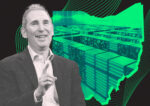The boom in data centers as a real estate investment shows no signs of slowing as the prominence of artificial intelligence grows.
The sector is poised to remain a hot one for real estate, though not without challenges, CNBC reported. The number of data centers in the United States trounces that of other countries, as the nation’s top tech companies are pouring more cash into the infrastructural need for the facilities.
There are more than 2,800 data centers in the country, compared to roughly 400 in the United Kingdom. Tech companies rely on the data centers as a way of powering their computing needs.
Data centers aren’t just a critical technological need, however. They’re also a real estate play, one that can be worth billions.
“We see data centers as the most exciting asset class,” Nadeem Meghji, global co-head of Blackstone Real Estate, told “Squawk on the Street” several months ago.
Unsurprisingly, Amazon and Microsoft are among the companies infusing dollars into data centers. Amazon is in the midst of a $35 billion push to expand its data center business in Virginia by 2040. Microsoft and OpenAI, meanwhile, are considering developing a $100 billion data center of their own.
Demand for land that can be used to house data centers is exploding as the need for computing power increases. That can be a boon to local landowners with land to sell, as well as municipal tax revenues, as the companies interested in data centers are often ones with some of the strongest balance sheets. Northern Virginia and Silicon Valley are already top markets in the sector; Boise, Reno and Columbus, Ohio are among the markets emerging to challenge the established regions.
Private equity partnerships with data center providers are also bringing more capital into the sector.
Read more



But people often don’t want to live near data centers, whether due to aesthetics or environmental concerns, prompting the occasional lawsuit from residents.
Energy companies are also being drained by data centers, forcing them to propose rate hikes and causing some stress on the electric grid; some have started looking towards bringing renewable energy into the sector.
